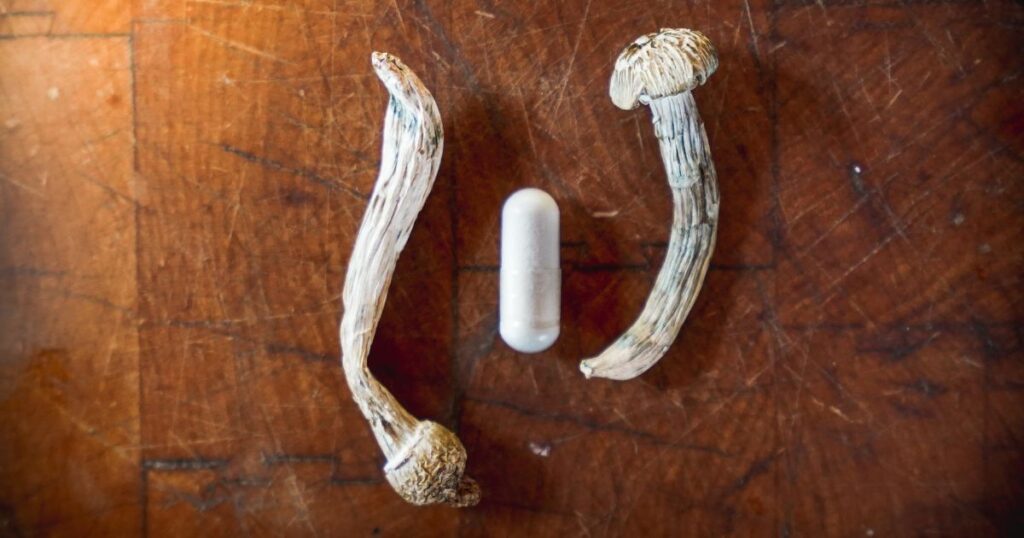Mental health crises continue to impact millions across the nation, with traditional treatments often falling short. New York lawmakers are now aiming to turn to nature as a solution. A newly refiled bill, introduced by Senator Nathalia Fernandez and fellow co-sponsors, could legalize psilocybin-assisted therapy by 2025. This proposal, which offers an approach to tackling mental health conditions, reflects the growing momentum across the country to legitimize natural medicines, including psychedelics, as viable therapeutic tools.
What Would the Psilocybin Therapy Bill Do?
The newly reintroduced bill, titled S495, is a proposal aimed at establishing psilocybin-assisted therapy as a legal medical treatment within New York. Here’s a breakdown of its key components:
Certified Psilocybin-Assisted Therapy
- Patients with qualifying conditions would be able to access psilocybin treatment under the supervision of a licensed facilitator.
- Sessions could take place in certified clinical settings or even at the patient’s home if travel is an issue.
- This ensures accessibility while maintaining strict professional oversight to guide patients through the therapy safely.
Protections Against Prosecution
The bill includes legal protections for both patients and facilitators, shielding them from state-level prosecution for activities conducted lawfully within the program. This protection is essential for fostering trust and encouraging participation in therapy without fear of legal repercussions.
Psilocybin-Assisted Therapy Grants
The legislation proposes the creation of a Psilocybin Assisted Therapy (PAT) grant program. This grant would fund therapy access for:
- Veterans
- First responders
- Low-income individuals
A budget of $5 million has been proposed to support the grant program, ensuring cost does not become a barrier for those in need.
Pilot Program for Mushroom Cultivation
To keep costs lower, the bill also tasks the Department of Agriculture and Markets with overseeing a pilot program for cultivating psilocybin mushrooms. This locally managed initiative would provide certified facilitators with access to naturally grown psilocybin, in addition to any FDA-approved alternatives.
An Advisory Board for Oversight
The program would include a Psilocybin-Assisted Therapy Advisory Board. This board’s role would involve recommending best practices and overseeing the safe implementation and evolution of the therapy framework.
Research and Reporting
The state would promote research on psilocybin’s medical uses in collaboration with universities and relevant institutions while providing two reports per year to track progress, implementation, and impact.
The Push for Psychedelic Medicine in New York
This isn’t the first time legislators have sought to legalize psilocybin therapy in New York. A similar bill filed by Senator Fernandez last session saw minor traction but ultimately stalled in committee. However, this renewed push reflects a broader and growing movement across New York and the United States to explore alternative therapeutic options for treating mental health issues.
Why Now?
Lawmakers have been vocal about the urgency of addressing the ongoing mental health crisis facing millions of Americans. Traditional therapies often fail to meet patient needs, and suicide rates and untreated PTSD, especially among veterans and first responders, have reached unprecedented levels. Psilocybin therapy has shown immense promise as a mental health intervention, with multiple studies highlighting its potential to address conditions like depression, anxiety, and post-traumatic stress disorder (PTSD).
Over the last few years, several other bills around psychedelic therapy have emerged in New York:
- 2022: Assemblymember Pat Burke proposed a pilot psilocybin therapy program targeting 10,000 participants.
- 2021: Assembly Health Committee Chair Amy Paulin introduced a bill to legalize psilocybin use for adults following a health screening and educational course.
- Additional measures by legislators, such as Assemblymember Linda Rosenthal, have sought to decriminalize natural psychedelics like psilocybin and ibogaine entirely.
Though these initiatives fell short, the reintroduction of a research-backed proposal like S495 shows lawmakers’ determination to advance this movement forward.
How Psilocybin Therapy Promotes Mental Health
The decision to refile a bill supporting psilocybin therapy stems from its demonstrated therapeutic impacts. Psilocybin, a naturally occurring compound found in certain mushrooms, has been studied extensively for its potential to treat mental health disorders. Here’s what sets it apart:
- Neuroplasticity: Psilocybin stimulates brain activity and increases neuroplasticity, helping patients break negative thought patterns associated with disorders like depression.
- Deep Emotional Processing: Therapy sessions involving psilocybin often lead to profound self-reflection, allowing patients to confront and process trauma effectively.
- Reduced Dependency on Traditional Pharmaceuticals: Patients turn away from long-term dependency on prescription medication, which often comes with unwanted side effects.
A Step Toward Normalizing Natural Medicines
The refiled bill represents more than just a specific therapeutic intervention; it signals a societal shift toward accepting natural remedies within mainstream healthcare.
Once stigmatized and associated with countercultural movements, substances like psilocybin are now being backed by scientific research and embraced by prominent institutions. This new wave of acceptance shows both the therapeutic potential of such compounds and the growing recognition of the limitations of our current healthcare models.
Efforts to legalize natural medicines echo other historical movements, such as cannabis legalization, where grassroots advocacy and emerging medical research shaped public policy. Psychedelics now follow a similar trajectory, gaining traction among millions in need of alternative treatment methods.
Despite the enormous potential of psilocybin therapy, its success depends on thoughtful implementation and lawmakers working together for the people. For the legislation to move forward, bipartisan support will be critical. If passed, New York would join a growing number of U.S. states blazing the trail toward integrating psychedelics into mainstream therapy.


















